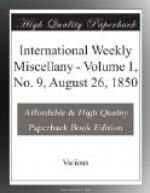“No!” said the witness, with all the gushing tenderness of a mother—“No! I would not add a sorrow to her heart, nor that of her son!”
Admissions in the evidence followed, and hopes were uttered for the prisoner’s acquittal, that changed the whole character of the testimony. What was a few moments before so dark, grew light, and without the slightest act that might be construed into an unfair advantage, in the hands of Prentiss, the witness pleaded for the accused.
Soon after Mr. Prentiss settled in New Orleans, a meeting was held to raise funds for the erection of a suitable monument to Franklin. On that occasion, the lamented Wilde and the accomplished McCaleb delivered ornate and chaste addresses upon the value of art, and the policy of enriching New Orleans with its exhibition. At the close of the meeting, as the audience rose to depart, some one discovered Prentiss, and calling his name, it was echoed from all sides—he tried to escape, but was literally carried on the stand.
As a rich specimen of off-hand eloquence, I think the address he delivered on that occasion was unequaled. Unlike any other speech, he had the arts to deal with, and of course the associations were of surpassing splendor. I knew that he was ignorant of the technicalities of art, and had paid but little attention to their study, and my surprise was unbounded to see him, thus unexpectedly called upon, instantly arrange in his mind ideas, and expressing facts and illustrations that would have done honor to Burke, when dwelling upon the sublime and beautiful. Had he been bred to the easel, or confined to the sculptor’s room, he could not have been more familiar with the details of the studio—he painted with all the brilliancy of Titian, and with the correctness of Raphael, while his images in marble combined the softness of Praxiteles, and the nervous energy of Michael Angelo. All this with Prentiss was intuition—I believe that the whole was the spontaneous thought of the moment, the crude outlines that floated through his mind being filled up by the intuitive teachings of his surpassing genius. His conclusion was gorgeous—he passed Napoleon to the summit of the Alps—his hearers saw him and his steel clad warriors threading the snows of Mount St. Bernard, and having gained the dizzy height, Prentiss represented “the man of destiny” looking down upon the sunny plains of Italy, and then with a mighty swoop, descending from the clouds and making the grasp of Empire secondary to that of Art.
I had the melancholy pleasure of hearing his last, and, it would seem to me, his greatest speech. Toward the close of the last Presidential campaign, I found him in the interior of the State, endeavoring to recruit his declining health. He had been obliged to avoid all public speaking, and had gone far into the country to get away from excitement. But there was a “gathering” near by his temporary home, and he consented to be present. It was




